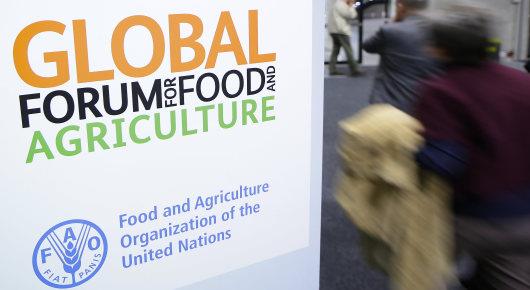FAO reaffirms commitment to water security for a thirsty sector

As the ninth Global Forum for Food and Agriculture wound down in Berlin this week, FAO expertise and ideas on the subject of water and agriculture became key “takeaways” for many participants. The Organization was well represented throughout the three-day series of events, including by Director-General José Graziano da Silva.
The Organization was responsible for one of the Forum’s two high-level panels and an expert panel, and participated in two additional expert discussions. Visitors could also talk FAO staff and pick up publications at FAO’s stand at the Forum’s “cooperation market” or exhibition.
FAO convened a group of international experts to discuss whether and how wastewater can provide agriculture with water for irrigation and nutrients such as phosphate for soil replenishment. Panelists from WHO, the World Bank, UNESCO, FAO and the Leibniz Research Alliance ‘Food and Nutrition’ made the case in favour, noting at the same time that lack of good infrastructure often hinders the reutilization of wastewater, particularly in developing countries.
"Although more detailed data on the practice is lacking, we can say that, globally, only a small proportion of treated wastewater is being used for agriculture, most of it municipal wastewater,” said Marlos De Souza, a senior officer with FAO's Land and Water Division and a member of the panel. “But increasing numbers of countries — Egypt, Jordan, Mexico, Spain and the United States, for example — have been exploring the possibilities as they wrestle with mounting water scarcity."
The latest guiding document is the WHO-, UNEP- and FAO-produced Guidelines for the safe use of wastewater, excreta and greywater from 2006, which should be updated and supported by robust legislation to increase the ratio of reused wastewater, the experts recommended.
With many parts of the world already short on water, a rethinking of water management practices is unavoidable.
Additionally, climate change is altering hydrological regimes everywhere, Graziano da Silva said. FAO’s Director-General, who chaired the high-level panel on Day 2 of the Global Forum, cited estimates that about one billion people in dry regions are expected to face increasing water scarcity in the near future.
Graziano urged the audience to rise to the food security challenges posed by water scarcity on two fronts: first, promoting ways of using less water and using it more efficiently, and secondly, by taking steps to secure access to water — especially for poor family farmers.
At the last UN climate summit, COP 22 held in Marrakech in November 2016, FAO launched a global framework for coping with water scarcity in agriculture to support such efforts.
As the closing event of the Global Forum, the Agriculture Ministers’ Conference was attended by a record number of delegations. Representatives of 83 countries endorsed an ambitious communique, articulating a common position. The document was handed over by German Federal Minister Christian Schmidt to FAO Director-General Graziano da Silva, representing FAO and UN Water.
25 January 2017, Budapest, Hungary
